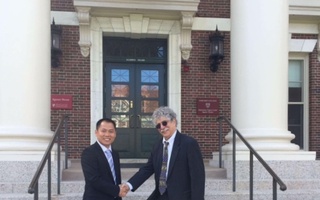Chinese students at Harvard said they were pleased with President Bush's recent executive order, which will allow them to remain in the United States until 1994.
"We appreciate that the President has shown his clearness and sincerity in protecting Chinese students in the U.S.," Haiching Zhao, chair of the National Committee on Chinese Student Affairs, said yesterday.
Last Wednesday, Bush ordered that all deportation proceedings against Chinese nationals be delayed until 1994.
Zhao, who is also a post-doctoral fellow in biochemistry at Harvard, tied the status of Chinese students in the U.S. to the democracy movement in China.
"Now we can really concentrate our efforts on the democracy movement and democracy in China, instead of on our own lives," said Zhao.
Still, Zhao mentioned that Bush's action may be too late for some Chinese nationals residing in the U.S. who have left for Europe on business. They have been told by the U.S. consulates that they must return to Shanghai before they can apply for re-entry to the United States.
Zhao said he saw the order as a possible solution for the problems nationals have had recently with the United States Immigration and Naturalization Service.
Last November, Bush vetoed a bill which would have allowed Chinese students to remain in the U.S., but promised he would issue an executive order to ensure their safety.
Zhu Taoying, a spokesperson for the Chinese embassy said the Chinese government continues to express dissatisfaction with U.S. policy. The Chinese government released a statement last December which said the U.S. government had overstepped its bounds and was interfering in Chinese internal affairs and damaging Sino-U.S. relations.
Students at Harvard also criticized Bush's measure.
Bush's order sends a message to Chinese intellectuals that "your technical skills...are not really important enough to America to warrant legislative protection," said Oscar K. Hsu '93, a co-cordinator of Harvard Students for a Democratic China.
Also, some nationals said they felt the executive order was "no legal guarantee" of their safety in the United States. Because the executive order can be revoked at any time, the "whole situation is not legally guaranteed," said Yuan Liu, president of the China Information Center.
Bush's order gives the message that Chinese students are "expendable" in foreign diplomacy, said Hsu. "The Chinese nationals who are here are getting a raw deal."
Liu also added that students face problems within the U.S. as well. Liu said that students who finish their schooling by this May could be denied the work visas they need to earn money for basic necessities.
Other students expressed optimism that the order is a sign the president's policy toward China is changing. "His China policy is changing," said Pei Minxan, a graduate student in Government, "His early gamble did not pay off."
Read more in News
Physics Tenures Its Second Woman Prof.Recommended Articles
-
Pushing for Change Across the OceanThe events which have taken place in the People's Republic of China during the last three months have not gone
-
Students From China React to Appearance of Their PresidentMany people are interested in what Chinese President Jiang Zemin has to say on his visit to Harvard on Friday,
-
Bush Was Right on ChinaTo the Editors of The Crimson: We are writing to set the record straight on the Bush Administration's policy of
-
Foothold in ChinaTo the Editors of the CRIMSON: Although I agree with the general theme of your Wednesday editorial on "New China,"
-
 Donor Funds Ed School Research on Chinese Academic Stress
Donor Funds Ed School Research on Chinese Academic Stress













